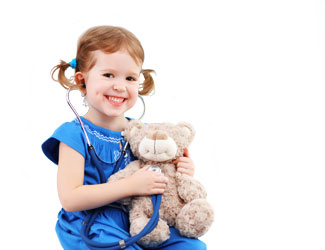Careful Diagnosis Needed to Uncover Cause
While some bladder control problems may be related to behavior or development issues, others are due to a physical concern or birth defect of the urinary tract. Careful diagnosis can uncover the cause of painful urination, poor bladder control, and/or recurrent UTIs and may identify conditions that affect the bladder and sphincter muscles that control urination. Urologists will also inquire about your child’s bowel habits because bladder and bowel function are closely related. A proper diagnosis by our experienced pediatric urology team ensures your child receives personalized treatment that cures the condition, when possible, and allows them to live more fulfilling lives.
Comprehensive Physical Exam
A comprehensive physical exam gives us important information about your child's bladder and bowel function. The physical exam includes simple tests of your child’s lower-body reflexes, muscle strength, and sensations to check for any brain or nerve problems. Additionally, an abdominal and genital exam will be performed. Our team aims to be discrete and sensitive to you and your child's concerns.
Your child’s urologist may also recommend:
- Blood and urine tests to look at kidney function and rule out infection
- An ultrasound to examine the urinary tract (bladder and kidneys)
- An MRI to look for kidney, bladder, or spinal cord problems that could affect urinary and bladder function
We Are Thorough but Avoid Unnecessary Testing
Depending on your child's symptoms and test results, we may use other tests to take a closer look at how your child’s bladder, kidneys, and urethral sphincter muscles function. Our goal is to be thorough but to avoid subjecting your child to unnecessary testing.


